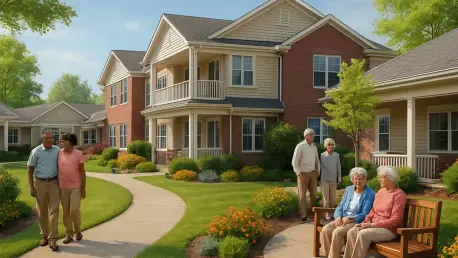Imagine a community where older adults can thrive in affordable, thoughtfully designed homes tailored to their needs, surrounded by spaces that foster connection and well-being. In Edwalton, Nottingham, this vision is becoming reality with Anchor’s latest housing development on Melton Road, recently marked by a significant “topping out” ceremony. This event, celebrating the completion of the structural phase, has sparked conversations across housing sectors about the urgent need for senior-specific accommodations. This roundup gathers diverse perspectives from industry leaders, local authorities, and development partners to explore the implications of this 80-home project for affordable later-living solutions in the Rushcliffe area. The focus is on collaborative efforts, innovative designs, and the broader impact on community-building for an aging population.
Diverse Voices on a Landmark Senior Housing Project
Insights on Addressing a Growing Demographic Need
Stakeholders in the housing sector emphasize the critical demand for affordable residences for older adults, particularly in regions like Rushcliffe where the aging population is expanding. Representatives from not-for-profit organizations highlight that projects like the one in Edwalton, offering 31 one-bedroom and 49 two-bedroom rental apartments, directly tackle local housing shortages. Their perspective centers on ensuring dignity in aging through accessible, high-quality living spaces.
In contrast, government agency voices stress the strategic importance of funding mechanisms like the Affordable Homes Program. Such initiatives enable developments to scale up and meet broader societal needs. They point out that without public investment, many communities would struggle to address the housing gap for seniors, underscoring the need for sustained financial support over the coming years, from 2025 onward.
A differing angle comes from urban planners who caution against over-prioritizing senior housing at the expense of other community requirements, such as youth facilities or general affordable housing. While acknowledging the value of tailored projects, they advocate for a balanced approach to urban development to ensure inclusivity across all age groups. This diversity of opinion reveals the complexity of housing policy decisions.
Perspectives on Design and Community Integration
Development partners involved in the Edwalton project praise the integration of communal features like landscaped gardens and seated patios, designed to enhance residents’ quality of life. Industry professionals in construction and design note that such elements are not mere add-ons but essential for fostering social bonds among older residents. They argue that these spaces set a new standard for what senior living can achieve in terms of emotional and physical well-being.
Local community advocates offer a complementary view, focusing on how these designs bridge generational divides by creating inviting environments for family visits and community events. Their input suggests that senior housing should not isolate but rather integrate older adults into the broader social fabric, a goal they see reflected in this development’s layout.
However, some property management experts express concern over the long-term maintenance of these communal areas. They warn that underestimating upkeep costs could diminish the intended benefits if budgets are not carefully planned. This cautionary stance highlights a practical challenge that future projects must address to sustain the initial vision of such innovative designs.
Opinions on Innovation and Scalability in Senior Housing
Emerging trends in later-living accommodations, such as sustainable building practices and technology integration, are a focal point for architectural innovators. They commend the Edwalton initiative for aligning with these forward-thinking approaches, suggesting that energy-efficient materials and smart home features could become benchmarks for similar projects. Their enthusiasm lies in the potential to reduce environmental impact while enhancing resident comfort.
Regional housing analysts provide a broader context, pointing out disparities across the UK in access to senior-specific housing. They speculate that successful models like this one could inspire replication in underserved areas, provided local governments and developers adapt the framework to regional needs. Their perspective emphasizes scalability as a key factor in addressing national housing challenges.
On the other hand, some policy critics challenge the idea that senior housing is a niche issue, arguing it should be a core component of equitable urban planning. They believe that prioritizing such projects benefits society as a whole by reducing healthcare burdens and supporting independent living. This viewpoint pushes for a cultural shift in how housing priorities are set at both local and national levels.
Collaboration as the Cornerstone of Success
Partnerships among not-for-profit entities, government bodies, private developers, and local councils are widely credited for the progress in Edwalton. Development leaders stress that this synergy allows for shared expertise and resources, resulting in a project that meets high standards of affordability and design. Their take is that collaboration is not just beneficial but essential for tackling complex housing issues.
Local authority figures echo this sentiment, highlighting the trust and community engagement fostered through these alliances. They note that involving residents and stakeholders from the planning stage builds a sense of ownership and ensures the project aligns with local values. This perspective underscores the importance of dialogue in creating meaningful outcomes.
Comparatively, housing consultants who have observed other initiatives across the country suggest that this collaborative model could reshape senior housing nationwide if adopted more widely. They point to the potential for such partnerships to address not only housing but also related social services, creating holistic support systems. This forward-looking analysis adds depth to the discussion on how teamwork can drive systemic change.
Reflecting on a Shared Vision for Senior Living
Looking back, the insights gathered from various stakeholders paint a comprehensive picture of the Edwalton senior housing milestone. The discussions reveal a consensus on the urgent need for affordable, tailored accommodations for older adults, balanced by practical concerns over design maintenance and resource allocation. Differing views on prioritization and scalability enrich the conversation, while the power of partnership emerges as a unifying theme that made this achievement possible. For those inspired by this progress, exploring resources from not-for-profit housing providers or engaging with local councils to advocate for similar initiatives could be an impactful next step. Supporting public-private collaborations and pushing for senior-specific designs in future housing plans stand as actionable ways to build on this foundation, ensuring more communities benefit from inclusive, supportive living environments.









